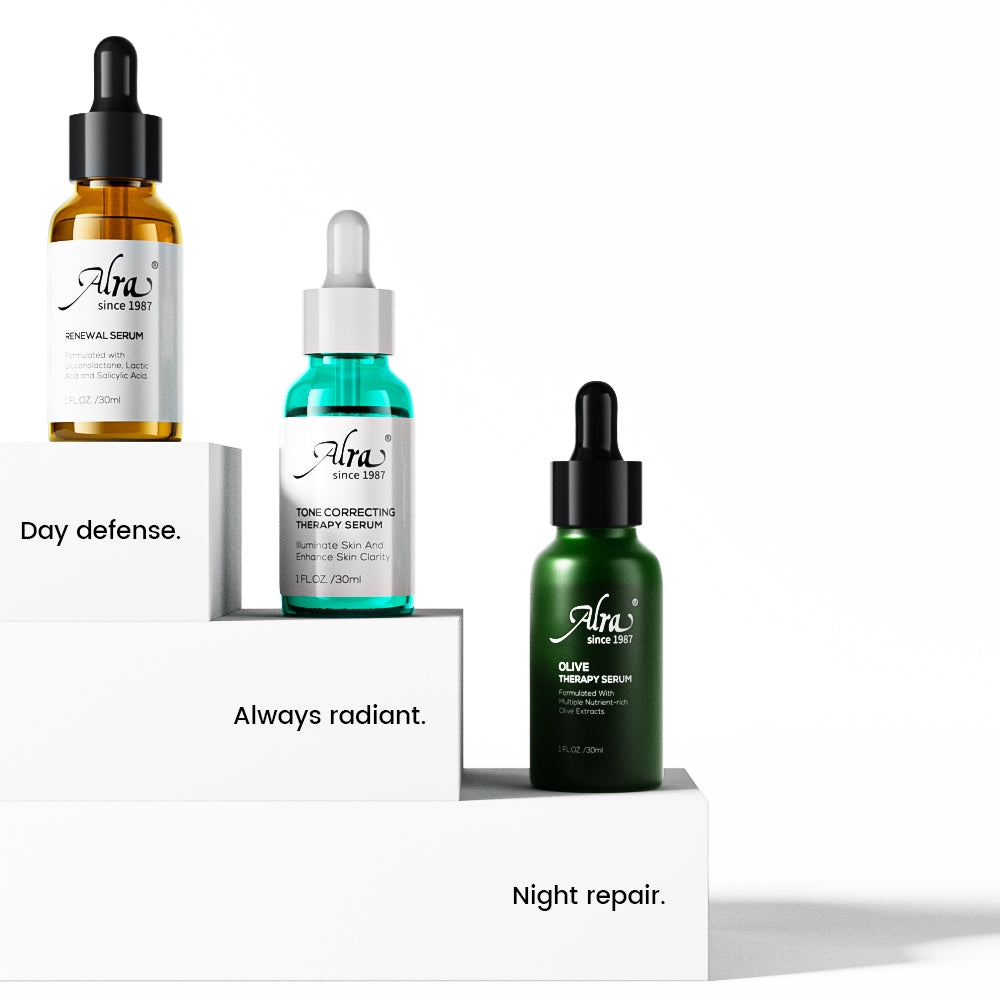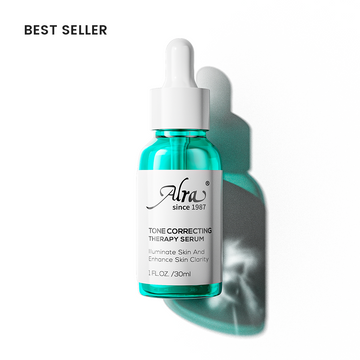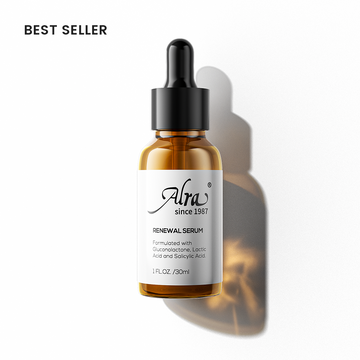Blog
Can You Use Lotion on Face?
Have you ever been in a situation where your cheeks are dry after a shower and you realize you’ve run out of facial moisturizer? There’s this bottle of your usual lotion sitting on your desk, and you wonder if you could apply it too. On the face? It's a common query, especially when we want to simplify our skin care routines or save a little money. But, please remember, your skincare routine is what you make it, and before you make it a regular practice, let’s dive into the real differences between body lotion and facial moisturizer. What Sets Facial Moisturizers and Body Lotion Apart? Conventional Body lotions often contain moisturizing ingredients, such as butters or oils, to lock in moisture. However, these heavier ingredients may exacerbate skin problems like acne on your face. You can also choose a body lotion based on your attraction to body lotion scents, but these scents can easily irritate delicate facial skin. Facial lotions tend to contain more active ingredients that can help address skin concerns. These ingredients tend to cost more, so they are often not included in body lotions. Body lotions are formulated to address the needs of the thicker, less sensitive skin on our bodies. They often contain heavier, more fragrant ingredients and may not address specific facial skin concerns like acne, oiliness, or fine lines. Facial moisturizers, however, are designed to be lighter, non-comedogenic (meaning they won't clog your pores), and cater to a wider range of skin types and issues. Because facial skin usually spends more time exposed to elements such as heat, cold, or the sun’s UV rays. Therefore, many facial products serve a dual purpose: they help protect facial skin from potential damage while also improving any skin concerns you may have. In other words, they may be too tough or aggressive for the sensitive skin on your face. Creams, on the other hand, are specially designed to protect delicate skin. Many facial skin care products also serve more specific purposes, such as treating acne or reducing redness or discoloration, dark spots, or wrinkles. These skin problems tend to be more common on the face due to its thinner skin and more sebaceous glands. In fact, you'll notice that many facial products aren't lotions at all. Instead, they are creams. "Creams are typically more intense, while lotions are more water-based and liquid," explains Dr. Anna Chacon, a dermatologist in Weston, Florida. What Lotion Is Okay to Use on Your Face? In a pinch, a body lotion can be used on the face, especially if it's formulated for sensitive skin and is fragrance-free. Alra Therapy lotion is an excellent body moisturizer that is well-suited for all skin types. It has a natural formula, free of harsh chemicals. It is paraben-free, alcohol-free, and petroleum-free, which makes it a perfect choice for sensitive skin. It is fragrance-free and cruelty-free i.e., no animals were harmed while testing this product. Alra Therapy lotion offers reliable and calming relief from dry, itchy, and inflamed skin caused by various skin disorders such as dermatitis. It minimizes skin sensitivity and prevents irritation for many patients undergoing cancer treatments such as radiation or chemotherapy, without interfering with treatment.
Aprende másUnderstanding Body Odor and Choosing Between Deodorants and Antiperspirants
Speaking of personal hygiene, understanding what is body odor and how it is generated, and the difference between deodorant and antiperspirant is crucial for choosing the right product for your needs. What is Body Odor? Body odor is what you smell when your sweat comes in contact with the bacteria on your skin. There are two types of sweat glands: eccrine and apocrine, apocrine sweat glands are mainly located in the armpits and navel fossa of our body. When we sweat, the apocrine glands secrete a small amount of lactic acid, glycoproteins, amino acids, electrolytes and other components, which accelerate the reproduction and fermentation of skin microbiota. During the metabolism process of microorganisms, they will produce a large amount of short-chain fatty acids and biogenic amines, and these two substances are the main sources of the "special" odor in the human body. That is what we call “body odor”. So sweat itself doesn’t smell, but when the bacteria on your skin mix with your sweat, it causes an odor. Differences between Deodorant and Antiperspirant Deodorants and antiperspirants, while both used for personal hygiene, function differently based on their distinct scientific mechanisms. Deodorants, especially the non fragrance deodorant, aim to combat body odor, which primarily originates from the bacterial breakdown of sweat on the skin. Their action is not to totally reduce sweating but rather to inhibit bacterial growth and mask odor. This is typically achieved through antimicrobial agents, creating an environment hostile to bacteria. On the other hand, antiperspirants are designed to reduce or prevent sweating, particularly in areas like armpits. They contain aluminum-based compounds (e.g., aluminum chloride or aluminum zirconium trichlorohydrex gly) that temporarily block the sweat ducts in the skin. This blockage significantly reduces the amount of sweat that reaches the skin's surface. Due to their action of altering bodily function, antiperspirants are often regulated as over-the-counter drugs in many regions. Don’t Know Which One to Choose Benefits of Deodorant: Sweating is your body’s natural response, but it's not the sole cause of body odor. Rather, it's the mix of sweat and skin bacteria that produces an unpleasant scent. Even if you can get past the visual of sweat, the odor from armpitsmay embarrass you. Rather than stopping sweat like antiperspirant, deodorant works on the bacteria on the skin to stop the odor escaping from your armpits biologically. A quality deodorant not only tackles body odor but also spreads a fresh, natural scent that doesn't clash with other fragrances,serves itself as a non fragrance deodorant. Moreover, using deodorant can boost your confidence and alleviate feelings of self-consciousness. This is especially beneficial during physical activities like gym workouts or competitive sports, as it helps you focus on your performance without the distraction of worrying about body odor. Benefits of Antiperspirant: Antiperspirants may have the added benefit of acting as a deodorant because of how the product works. When antiperspirant blocks sweat glands, it also prevents odors from escaping, reducing the unpleasant odor that occurs when you sweat. However, antiperspirants often contain aluminum compounds. According to the article Aluminium, Antiperspirants and Breast Cancer published in the Journal of Inorganic Biochemistry, there is increasing evidence that the chemical constituents of underarm and body cosmetics applied to the underarm and breast area may be involved in the rising incidence of breast cancer. Aluminum salts, such as aluminum chlorhydrate (ACH), are the active ingredient of antiperspirants in these cosmetics. So the benefits of using antiperspirant are temporary, and will have some impact on the body, although bathing or washing the body can remove the antiperspirant and restore the perspiration capacity of the affected glands. But be sure to think carefully when choosing an antiperspirant. Choosing the Right Deodorant Alra non-metallic deodorant is a long-lasting, effective, mild light fragrance that suits all occasions and doesn't interfere with the use of any other perfume, is free from any toxic, metallic ingredients, and 100% no-residue guarantee. Alternatively, if you want to talk to one of our Customer Care to inquire, they can be reached at (888) 508-ALRA (2572) or email CustomerCare@alra.com. References: Jingxi, J. (2019). The Secret War of Cells. Science Enlightenment, (05), 41. D. Darbre.(2005).Aluminium, Antiperspirants and Breast Cancer. Journal of Inorganic Biochemistry, Volume 99, Issue 9 Pages 1912-1919. https://www.sciencedirect.com/science/article/abs/pii/S0162013405001613
Aprende másElegir un desodorante sin aluminio es importante
Si bien los factores e ingredientes de su desodorante pueden no parecer tan importantes, cuando recibe un diagnóstico de cáncer y comienza el tratamiento, el desodorante que usa todos los días sí importa. Ahí es cuando llega el momento para que mires de cerca los productos que utilizas y elijas un desodorante sin aluminio para usar durante el tratamiento que puede hacer un gran trabajo para usted sin ningún riesgo o problema potencial.
Aprende más







